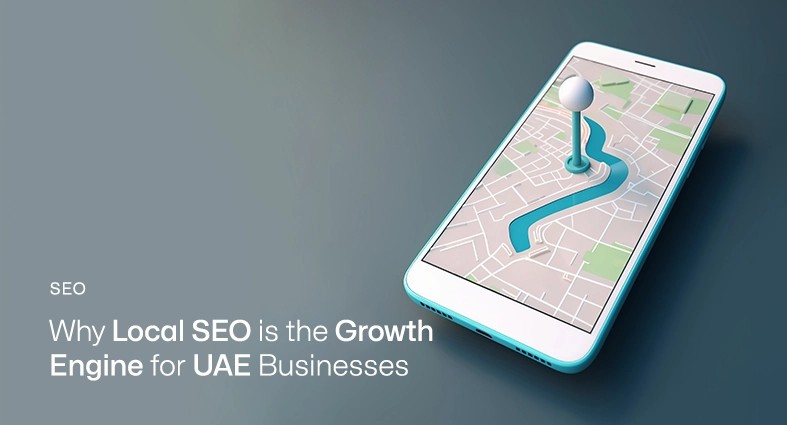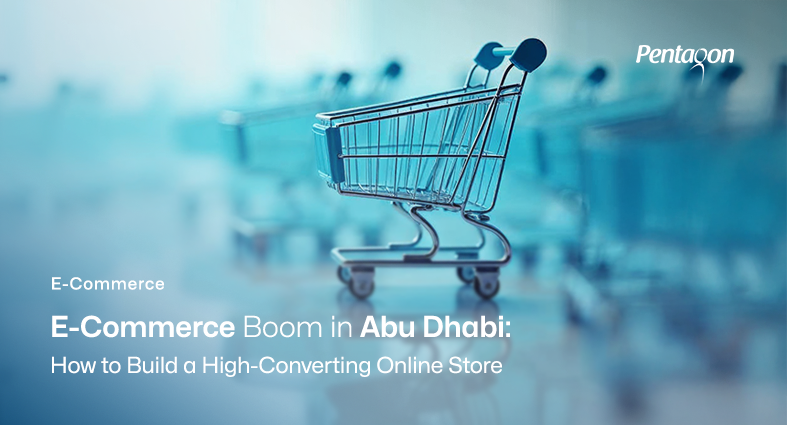E-commerce has become a powerful force, transforming the way businesses operate and customers shop. For e-commerce websites in Abu Dhabi, harnessing the potential of search engine optimization (SEO) is crucial to stand out in the competitive online landscape and drive sales. SEO involves optimizing various aspects of a website to improve its visibility and organic ranking on search engine results pages (SERPs). In the bustling e-commerce landscape of Abu Dhabi, SEO is not just a luxury but a necessity for businesses looking to thrive and succeed. With the increasing number of online shoppers and the growing competition in the market, e-commerce websites must harness the power of SEO to stay ahead of their competitors. By implementing effective SEO strategies, businesses can ensure that their websites are visible to potential customers when they search for relevant products or services. This visibility leads to increased brand exposure, credibility, and ultimately, higher chances of generating sales.
This comprehensive guide is designed to help Abu Dhabi businesses understand the importance of SEO in boosting their online presence and increasing sales. We will delve into the specific SEO techniques that can elevate the visibility of e-commerce websites, enhance user experience, and ultimately drive targeted traffic and conversions. Whether you’re an established e-commerce brand or just starting your online journey, this guide will equip you with valuable insights and actionable strategies to create a thriving e-commerce empire in Abu Dhabi. Get ready to unlock the power of SEO and take your e-commerce business to new heights of success.
The role of SEO in driving organic traffic and boosting sales
Organic traffic, or the visitors who come to a website through non-paid search engine results, is a valuable asset for e-commerce websites. SEO plays a vital role in driving organic traffic by optimizing various on-page and off-page elements. By conducting thorough keyword research and strategically incorporating relevant keywords into the website’s content, meta tags, and headings, e-commerce websites can improve their search engine rankings and attract highly targeted organic traffic. SEO encompasses optimizing website structure, improving site speed, and enhancing the overall user experience. A well-optimized website that loads quickly and provides a seamless browsing experience will not only attract more visitors but also keep them engaged and encourage them to make a purchase.
By driving organic traffic to an e-commerce website, SEO acts as a catalyst for sales growth. When potential customers find a website through organic search results, they are more likely to trust the brand, view products as reliable, and ultimately convert into paying customers. The increased visibility, credibility, and user-friendly experience provided by SEO contribute to a higher conversion rate, leading to increased sales and revenue for e-commerce websites in Abu Dhabi.
Understanding the Importance of SEO for E-commerce Websites
Understanding the importance of SEO for e-commerce websites is crucial for businesses looking to thrive in the digital landscape. SEO plays a vital role in driving organic traffic and boosting sales by improving the visibility of websites in search engine results pages (SERPs). With effective SEO strategies, businesses can target relevant keywords, optimize their website’s on-page elements, and enhance the user experience to attract and engage potential customers. By appearing higher in search rankings, e-commerce websites can increase their online visibility, reach a broader audience, and ultimately drive more targeted traffic to their site. This increased visibility not only generates more opportunities for conversions but also builds brand credibility and trust. In today’s competitive market, understanding and implementing SEO techniques tailored to e-commerce websites is essential for achieving online success and maximizing sales potential.
Increased Visibility and Organic Traffic
One of the primary goals of SEO is to improve the visibility of e-commerce websites in search engine results pages (SERPs). By implementing various SEO techniques such as optimizing meta tags, headings, and content, businesses can increase their chances of ranking higher in SERPs. When a website appears on the first page of search results, it gains more visibility, making it more likely for users to click on the link and visit the site. Higher organic rankings have a direct impact on driving targeted traffic to the website. When a website ranks well for relevant keywords, it attracts users who are actively searching for products or services offered by the e-commerce business. These users are more likely to convert into customers as they have already expressed intent by conducting a search related to the business offerings.
Enhanced User Experience
- Website Navigation: When users can easily navigate through a website and find the products or information they need, they are more likely to stay longer and explore further. By organizing categories, implementing clear menus, and utilizing internal linking, e-commerce websites can enhance the navigation experience for users.
- Site Speed: Users expect websites to load quickly, and search engines consider page speed as a ranking factor. Optimizing images, minifying code, and utilizing caching techniques are some methods to improve site speed and provide a seamless browsing experience.
- Mobile Responsiveness: With a significant number of users accessing websites via mobile devices, having a mobile-friendly website is essential. Responsive design ensures that the website adapts to different screen sizes, allowing users to have a consistent and enjoyable experience regardless of the device they use.
SEO Techniques for E-commerce Websites
When it comes to optimizing e-commerce websites for search engines, several key techniques can make a significant impact. One essential aspect is keyword research and optimization. By conducting thorough keyword research, businesses can identify the relevant search terms that their target audience is using and incorporate them strategically into their website content. This includes optimizing on-page elements such as titles, meta descriptions, headings, and product descriptions with targeted keywords. Another crucial technique is product page optimization, where businesses focus on creating unique and compelling content for each product. This includes optimizing product descriptions, images, and customer reviews, highlighting the product’s features, benefits, and unique selling points. Local SEO is also vital for e-commerce websites, especially in Abu Dhabi. Implementing local SEO techniques such as optimizing Google My Business listings, creating location-specific landing pages, and utilizing local keywords can help businesses target customers in the Abu Dhabi region effectively. Additionally, technical SEO considerations play a crucial role in optimizing e-commerce websites. This involves optimizing website structure, implementing XML sitemaps, ensuring proper indexing and crawlability, and using canonical tags. Finally, link building and off-page optimization are essential to improve the authority and visibility of e-commerce websites. Building relationships with relevant industry influencers and obtaining authoritative backlinks can significantly enhance search rankings. By employing these SEO techniques, e-commerce websites can increase their visibility, attract targeted traffic, and drive sales.
Keyword Research and Optimization
Keyword research is the foundation of SEO for e-commerce websites. By conducting thorough keyword research, businesses can identify the most relevant and high-converting search terms for their product pages and categories. These keywords should align with the target audience’s search intent. Once the keywords are identified, they should be strategically integrated into on-page elements such as titles, meta descriptions, headings, and product descriptions. This optimization signals to search engines the relevance of the website’s content to specific search queries, increasing the chances of higher rankings in search results.
Product Page Optimization
Optimizing individual product pages is essential for improving search visibility and driving conversions. Businesses should focus on optimizing product descriptions, images, and customer reviews. Product descriptions should be unique, compelling, and informative, highlighting the product’s features, benefits, and unique selling points. Including relevant keywords naturally within the product description can further enhance its visibility in search results. High-quality images that showcase the product from different angles and provide zoom functionality can improve the user experience and encourage conversions. Additionally, encouraging customers to leave reviews and ratings can boost trust and credibility, making the product page more appealing to both search engines and potential buyers.
Local SEO for Abu Dhabi
For e-commerce businesses targeting customers in Abu Dhabi, implementing local SEO techniques is crucial. This involves optimizing Google My Business listings by providing accurate business information, such as addresses, contact details, and business hours. Creating location-specific landing pages that cater to the needs and preferences of the local audience can also improve search visibility. Leveraging local keywords throughout the website’s content and optimizing for location-based search queries can help businesses rank higher in local search results. Additionally, encouraging customers to leave positive reviews and ratings on platforms like Google and other local directories can enhance the website’s reputation and attract more local customers.
Technical SEO Considerations
Technical SEO ensures that search engine bots can crawl, index, and understand the website’s content effectively. Optimizing website structure involves creating clear navigation menus, logical URL structures, and an XML sitemap that guides search engines to all relevant pages. Implementing canonical tags helps prevent duplicate content issues and consolidates ranking signals for similar pages. Businesses should also ensure that their website loads quickly, as site speed is a ranking factor. Other technical considerations include optimizing for mobile responsiveness, implementing structured data markup, and utilizing schema.org markup to provide search engines with additional context about the website’s content.
Link Building and Off-Page Optimization
Link building is a crucial aspect of SEO for e-commerce websites. High-quality backlinks from authoritative websites signal to search engines the credibility and relevance of the website’s content. Building relationships with industry influencers, bloggers, and other relevant websites can help acquire these valuable backlinks. Engaging in guest blogging, sponsoring events, and participating in online discussions can also contribute to obtaining authoritative backlinks. Additionally, businesses should actively monitor and manage their online presence, seeking opportunities to get mentioned and linked to by reputable sources in their industry.
Measuring and Analyzing SEO Success
Measuring and analyzing the success of SEO efforts is essential to gauge the effectiveness of strategies and identify areas for improvement. Setting clear goals and key performance indicators (KPIs) allows businesses to track their progress and measure the impact of SEO on their e-commerce websites. Key metrics to monitor include organic traffic, conversion rates, keyword rankings, and engagement metrics. By regularly monitoring these metrics, businesses can gain insights into their SEO performance and make data-driven decisions to optimize their strategies. Utilizing SEO analytics tools like Google Analytics and Search Console provides valuable data on website performance, user behavior, and traffic sources. These tools offer comprehensive reports, allowing businesses to identify trends, measure the impact of SEO changes, and uncover opportunities for further optimization. Continuous measurement and analysis of SEO success ensure that businesses stay on top of their SEO efforts and adapt their strategies to stay ahead of the competition.
Setting Goals and Key Performance Indicators (KPIs)
To effectively measure SEO success, it is essential to establish clear goals and identify relevant key performance indicators (KPIs). Goals provide a direction for your SEO efforts and help determine the outcomes you want to achieve. Whether it’s increasing organic traffic, improving conversion rates, or enhancing keyword rankings, setting specific and measurable goals allows you to track progress and measure success. Alongside goals, selecting the right KPIs is crucial for monitoring the performance of your SEO strategies. KPIs are quantifiable metrics that indicate the success or failure of specific objectives. Examples of relevant KPIs for e-commerce websites include:
- Organic Traffic: An increase in organic traffic indicates improved visibility and optimization.
- Conversion Rates: Conversion rates track the percentage of website visitors who complete desired actions, such as making a purchase or filling out a form. Monitoring conversion rates helps evaluate the effectiveness of your SEO strategies in driving desired user actions.
- Keyword Rankings: Tracking the rankings of targeted keywords in search engine results provides insights into the visibility and competitiveness of your website. Higher rankings indicate better optimization and increased chances of attracting organic traffic.
Utilizing SEO Analytics Tools
To effectively measure and analyze SEO success, leveraging SEO analytics tools is crucial. These tools provide valuable insights into various aspects of your website’s performance and user behavior. Two widely used tools are Google Analytics and Google Search Console. Google Analytics offers a comprehensive set of features to track and analyze website traffic, user engagement, conversion rates, and more. It provides detailed reports on metrics like organic traffic, referral sources, user demographics, and behavior on your website. By examining these metrics, you can gain a deeper understanding of how your SEO strategies are performing and identify opportunities for improvement. Google Search Console, on the other hand, focuses specifically on the performance of your website in Google search results. It provides valuable data on search impressions, click-through rates, keyword rankings, and website indexing. Search Console also alerts you to any potential issues or penalties affecting your website’s visibility, allowing you to address them promptly.
Staying Ahead of the Competition
Staying ahead of the competition is vital for the success of e-commerce websites in Abu Dhabi. As the digital landscape continues to evolve, businesses must continuously adapt and optimize their SEO strategies to maintain their competitive edge. This involves staying updated with the latest algorithm changes, industry trends, and consumer behavior to ensure that their website remains relevant and visible to their target audience. By continuously monitoring and analyzing their SEO efforts, businesses can identify areas for improvement and make necessary adjustments to stay ahead of their competitors. It is also important to embrace innovation and explore new SEO techniques to differentiate themselves in the market. Moreover, seeking professional assistance from an experienced SEO agency in Abu Dhabi can provide businesses with the expertise, insights, and customized strategies needed to navigate the competitive landscape and outperform their competitors. By staying proactive, adaptive, and strategic in their SEO approach, businesses can establish themselves as leaders in the e-commerce industry in Abu Dhabi.
Continuous SEO Efforts and Adaptation
SEO is not a one-time endeavor; it requires continuous efforts and adaptation to remain effective. Search engine algorithms frequently update, and industry trends and consumer behavior evolve. To keep up with these changes, e-commerce websites must stay proactive in their optimization strategies. Continuous SEO efforts involve ongoing monitoring and optimization of various aspects, including keyword research, content creation, technical SEO, and link building. Regularly analyzing website performance, keyword rankings, and user engagement metrics allows businesses to identify areas for improvement and make necessary adjustments. By keeping content fresh, implementing new strategies, and refining existing ones, websites can maintain their competitive edge and drive consistent organic traffic and conversions. Adaptation is equally crucial in the SEO landscape. As algorithms evolve, it’s essential to stay informed about the latest updates and adjust SEO strategies accordingly. For example, search engines may prioritize mobile-friendly websites, voice search optimization, or user experience factors. By staying informed and adapting to these changes, e-commerce websites can ensure their visibility and rankings remain strong.
Seeking Professional SEO Assistance
While some businesses may have in-house SEO expertise, many benefit from partnering with a reputable SEO agency in Abu Dhabi. Professional SEO assistance offers several advantages, particularly in a dynamic and competitive environment. SEO agencies bring expert knowledge and experience to the table. They stay updated with the latest industry trends, algorithm changes, and best practices. By leveraging their expertise, businesses can access customized SEO strategies tailored to their specific goals and target audience. SEO agencies conduct thorough research, competitor analysis, and keyword optimization, helping businesses gain a competitive edge.
Additionally, working with an SEO agency allows businesses to focus on their core operations while leaving the complexities of SEO in capable hands. Agencies handle various tasks, including website audits, on-page and off-page optimization, content creation, and performance monitoring. With professional assistance, businesses can allocate their resources more efficiently and save valuable time. Also, SEO agencies have access to advanced tools and technologies that aid in data analysis, tracking website performance, and identifying optimization opportunities. By harnessing these tools, businesses can gain valuable insights and make data-driven decisions.
Conclusion
The power of SEO in driving sales for e-commerce websites in Abu Dhabi cannot be overstated. By implementing effective SEO techniques, such as keyword optimization, product page optimization, local SEO strategies, and technical SEO considerations, businesses can significantly improve their online visibility and attract targeted organic traffic. With enhanced visibility and a seamless user experience, e-commerce websites can build trust, engage customers, and ultimately increase sales. Businesses must stay updated with the latest SEO trends, continuously monitor and analyze their SEO efforts, and consider seeking professional assistance from an experienced SEO agency in Abu Dhabi. By harnessing the full potential of SEO, businesses can establish their e-commerce empire, expand their customer base, and achieve long-term online success. Ready to take your online presence to new heights? Look no further than Pentagon’s cutting-edge SEO services. Contact Pentagon today and let’s propel your business to the top of the search results!
services
Google Algorithm Updates 2023: The Year in Review
Feel free to send us a message.
Please, share your thoughts, and let's chat over a cup of tea.


















